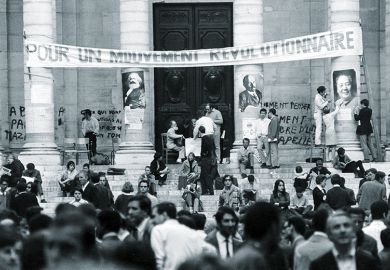There are not many activist-scholars whom I admire more than Lennard Davis. For me, he is a model of the kind of intellectual who is committed to actual change, having done more than his share of the mundane, unsexy work that is needed to accomplish real things. So when I read his recent Times Higher Education article, “Turn down the noise, roll up the sleeves” (Features, 5 September), I understood his impatience with academics and others who carelessly make gestures that seem to go against the grain and then claim that subversion is politics. Rubbish.
Davis says: “Let’s face it, subversion is easy. It’s much easier to write a snarky book review than a positive one. But passing legislation that redistributes wealth is more effective in combating income inequality than dancing rudely, naked and tattooed, in front of capitalists.”
That’s an eye-catching rhetorical move, but, ironically, it is not very politically astute. Davis notes the changing mediascape upon which modern politics is played out, yet his only recourse is backwards, to the good old days of simple political organising. I agree that we need to reconnect with both that ethos and the work it demands. But to regard this as an either/or is not helpful.
As Davis points out, world leaders have taken to Twitter to leak information, criticise opponents and promote themselves. One effect of this is for activists to try to beat them at their own game of subversion and theatrics. Davis suggests that we not try. I want to argue that reclaiming public space (both real and virtual) is an essential part of scholar-activism, and that public intellectual work cannot be effective without appreciating more fully how grabbing attention, and getting a message across, is essential.
The explosive and, yes, carnivalesque displays of gay pride were at least in part motivated by a desire to reclaim the streets after previously being hunted down in them; feminists “take back the night” for similar reasons. So rather than dismiss spectacle and transgression as antithetical to organised political work, let’s think more carefully. And let’s be sure not to forget that once you have a public’s attention, educating it for political ends is essential and doable.
Davis and I are of about the same generation. So surely he, too, remembers the slogan we chanted during the anti-war protests: “The whole world is watching.” By that, we were acknowledging the power of the media and the importance of “making a spectacle of ourselves”. We wanted the world to witness the brutal logic of the state as it inflicted violence upon us: violence that we saw as connected to the violence of the war. In some way, we were trying to bring the war home.
Davis might counter that all this was a pre-planned action. True. But I can think of two more contemporary instances of blending spontaneous spectacle with political efficacy.
One of the great accomplishments of the young survivors of the Parkland high school shooting was that, within a day of that appalling event, when many of their friends had been killed or grievously injured, they had mounted a sophisticated Twitter campaign that soon had many times more followers than the National Rifle Association. It has grown into a powerful lobbying campaign, #NeverAgain, and inspired more than 1.2 million people to march for gun control.
The NRA went after them with a vengeance. Among other things, it accused them of not understanding the ins and outs of gun control and of simply wanting to be celebrities, or even of being paid actors. But they learned quickly. I can’t imagine a better combination of actions than immediately occupying media space, disrupting the status quo, mounting a grass-roots campaign and getting educated and educating others.
Capturing attention in what might appear unseemly ways is an integral part of activism today, and, crucially, it need not be organised or even collective.
One of the recommendations Timothy Snyder makes in his 2017 book, On Tyranny: Twenty Lessons from the Twentieth Century, is to “stand out”: “The moment you set an example, the spell of the status quo is broken, and others will follow.”
In this light, consider the famous case of the “Plaid Shirt Guy”. A year ago, at a Donald Trump rally in Montana, the president was performing before his usual exuberant crowd, which filled the television screen as a raucous backdrop. But if you looked over Trump’s right shoulder, you could see a young man wearing an ordinary plaid shirt. Nothing remarkable – except that as the president gathered more steam and the crowd correspondingly grew more vociferous, the young man’s eyebrows arched up. You did not have to be a professional lip-reader to understand that he was uttering, over and over again, one word: “What?”
He was not flamboyant or even “active”. He was simply and spontaneously expressing the incredulity that many people also felt at the nonsense that Trump was spewing out. That “emperor’s new clothes” moment provided an important reality check – which Trump’s handlers caught on to pretty quickly, removing the Plaid Shirt Guy from view and replacing him with an avid Trump fan who knew what to do.
So let’s not automatically discount the political efficacy of spontaneous, unplanned subversion, of whatever kind. Such intrusions upon public space can serve to be the beginnings of a different, and powerful, sort of education.
David Palumbo-Liu is Louise Hewlett Nixon professor of comparative literature and, by courtesy, of English at Stanford University.
POSTSCRIPT:
Print headline: A fair shout for scholar-activism
Register to continue
Why register?
- Registration is free and only takes a moment
- Once registered, you can read 3 articles a month
- Sign up for our newsletter
Subscribe
Or subscribe for unlimited access to:
- Unlimited access to news, views, insights & reviews
- Digital editions
- Digital access to THE’s university and college rankings analysis
Already registered or a current subscriber?







